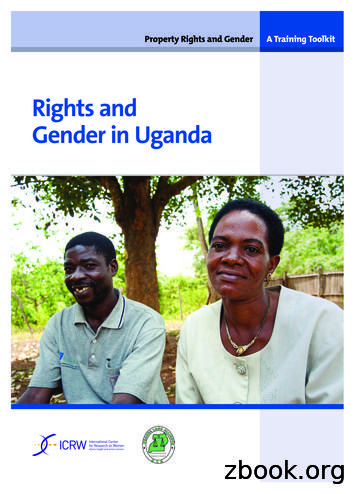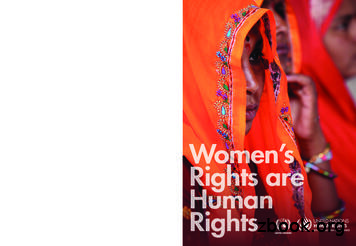HUMAN RIGHTS, CLIMATE CHANGE AND BUSINESS
Shutterstock/De PiyasetHUMAN RIGHTS,CLIMATE CHANGEAND BUSINESSKey Messages
INTRODUCTIONUnsplash/Nazarizal MohammadClimate change directly and indirectly interfereswith the enjoyment of all human rights, includingthe rights to life, housing, water and sanitation,food, health, development, security of person andan adequate standard of living. Furthermore, theimpacts of climate change exacerbate inequalitiesdisproportionately affecting persons, groups andpeoples already in vulnerable situations includingchildren, indigenous peoples, and persons withdisabilities.Effective responses to prevent, mitigate, and adaptto climate change must be anchored in international human rights and environmental standards andprinciples such as solidarity, cooperation, transparency, access to information, participation, equality, equity, accountability and the polluter pays andprecautionary principles.Business plays a central role in climate change.Much of the CO2 emissions causing climatechange come from business-driven economicactivity. However, business activities can alsocontribute to innovation and solutions to prevent,mitigate and adapt to climate change and itsadverse impacts on the planet and its people. Toavert future climate harms and ensure climatejustice, business enterprises must be part of thesolution.Introduction.1Climate Change and the UN Guiding Principleson Business and Human Rights.2PILLAR I: The State Duty to Protect HumanRights.3PILLAR II: The Corporate Responsibility toRespect Human Rights.4PILLAR III: Access to Remedy.5Advocating a rights-based approach to businessactivities related toclimate change.6The UN Guiding Principles on Business andHuman Rights (UNGPs) provide the authoritativeglobal framework to prevent and address negativehuman rights impacts related to business, whichinclude business-related human rights impacts fromclimate change. The UNGPs reflect core elementsof international human rights law. Any legal orpolicy responses to the human rights implicationsof climate change that involve business should bealigned with the UNGPs as well as with relevantinternational standards and their current interpretation.This document explores the main legal and policyimplications of the UNGPs for States and businesses with regard to human rights and climate change(Section I) and concludes with some of OHCHR’skey advocacy messages on this issue (Section II).Production of these materials was supported by a grant from:Federal Ministryfor Economic Cooperationand Development1www.ohchr.org
CLIMATE CHANGE ANDTHE UN GUIDING PRINCIPLESON BUSINESS ANDHUMAN RIGHTSUnsplash/Curioso Photography2www.ohchr.org
PILLAR I : The State Duty to ProtectHuman RightsStates must protect against climate change-related human rights abuse by business: All States have aduty to protect against human rights abuse by business within their territory and/or jurisdiction, including with respectto climate change.States should adopt “a smart mix of measures” to make business respect human rights in the contextof climate change: In discharging their duty to protect human rights, States should set out clearly the expectationthat all business enterprises respect human rights throughout their operations and prevent and mitigate adverseimpacts related to climate change. To do so, States should adopt and enforce a smart mix of laws, regulations andpolicies that encourage or oblige business to reduce emissions and to take other measures to prevent adverse humanrights impacts resulting from climate change. This may include requiring companies to exercise human rights duediligence, conduct environmental and climate impact assessments, and/or disclose greenhouse gas emissions andclimate change impacts. States should also consider measures to encourage business to prioritize low-carbon andzero-carbon investments.Address the State/business nexus: States should take additional steps to protect against human rights abuses bybusiness enterprises that are owned or controlled by the State, or that receive substantial support and services fromState agencies, including in the context of climate change. For instance, States and State-owned enterprises couldemploy strict sustainability requirements in their procurement contracts.Ensure policy coherence: National policy commitments, such as those made through National Action Plans onBusiness and Human Rights or through Nationally Determined Contributions under the UNFCCC, can and shouldaddress the role of business with respect to climate change and its adverse impacts on human rights.Unsplash/Photoholgic3www.ohchr.org
PILLAR II : The Corporate Responsibilityto Respect Human RightsBusiness enterprises should respect human rights in the context of climate change: The baselineresponsibility of all business enterprises is to respect all internationally recognized human rights, including in thecontext of climate change. This means that they should avoid infringing on human rights by taking proactive stepsto identify, prevent, mitigate and address adverse impacts with which they are involved, including impacts resultingfrom climate change.Go beyond legal compliance: The responsibility to respect human rights is a global standard of expected conductthat applies even in the absence of clear domestic climate obligations. The responsibility exists independently of States’ability and/or willingness to respect, protect and fulfil human rights including in the context of climate change.Moreover, it exists over and beyond compliance with applicable laws (such as domestic laws regulating companies’environmental impacts).Conduct human rights due diligence to identify, prevent and mitigate climate-related human rightsimpacts: In order to meet their responsibility to respect human rights, business enterprises should conduct humanrights due diligence that addresses the adverse climate change-related human rights impacts that the businessenterprise may cause or contribute to through its own activities, or which may be directly linked to its operations,products or services by its business relationships. On an ongoing basis, business enterprises should:Identify and assess any actual or potential adverse human rights impacts: In the context of climatechange, business enterprises should continuously assess how their environmental and climate impacts may leadto human rights harms. Impact assessments should prioritise the most severe human rights risks and focus on theimpacts on individuals and groups at heightened risk of vulnerability and marginalization. This process shouldinclude meaningful consultation with potentially affected stakeholders, including indigenous peoples and localcommunities. If it is not possible to sufficiently engage with all relevant stakeholders, businesses should considerreasonable alternatives such as consulting credible, independent expert resources, including environmentalhuman rights defenders and civil society.Integrate the findings, and take appropriate action to prevent and mitigate impacts: Businessesshould take the necessary steps across their activities and supply chains to cease or prevent any contribution theymake to human rights harms as a result of climate change. Further, they should use (and seek to increase) leverage to influence businesses with which they have relationships to prevent or mitigate any climate change-relatedharms (for instance to ensure compliance with climate and environmental standards).Track the effectiveness of their response: Tracking should draw on a range of expert sources so businessescan understand whether climate change-related human rights impacts are being properly addressed.Communicate how they address their human rights impacts externally: Businesses should publiclyprovide information that is sufficient to evaluate the adequacy of their response to climate change-related humanrights harms.Ensure policy coherence throughout business activities: Businesses should strive for coherence betweentheir responsibility to respect human rights and policies and procedures that govern their wider business activities andrelations, including as they relate to climate change. This should include, for example, climate change dimensions ofpolicies and procedures that set financial and other performance incentives for personnel; procurement practices; andlobbying activities where climate change-related human rights issues are implicated.4www.ohchr.org
PILLAR III : Access to RemedyWhen climate change-related human rights harms occur, all those affected must have access toeffective remedies: States must take appropriate steps to ensure access to effective remedies for human rightsharms linked to climate change. This includes providing effective judicial and non-judicial mechanisms, such asenvironmental tribunals, national human rights institutions and OECD National Contact Points. Alongside theseState-based mechanisms, States should consider ways to facilitate access to effective non-State-based grievancemechanisms.The role of business in remedy: To meet their responsibility to respect human rights, businesses must addressthe climate-related human rights harms with which they are involved. They should establish or participate ineffective operational-level grievance mechanisms that can remediate climate and environmental concerns raisedby affected persons. Business enterprises should participate in good faith, and not undermine, proceedings beforelegal or non-legal tribunals that promote accountability for climate harms. In the context of climate change,particularly where businesses have contributed to severe impacts (such as large businesses involved in thegeneration of electricity and heat, transportation, industrial agriculture, and other high emitting sectors), eachbusiness should provide for remediation appropriate to its share in responsibility for the harm.All forms of retaliation and reprisal must be prevented: All those seeking to access or interact withgrievance mechanisms should be able to do so without fear of reprisal.Unsplash/Markus Spiske5www.ohchr.orgwww.ohchr.orgwww.ohchr.org
ADVOCATING A RIGHTS-BASEDAPPROACH TO BUSINESSACTIVITIES RELATED TOCLIMATE CHANGEFlickr/DFID - UK Department for International Development6www.ohchr.org
A NUMBER OF MEASURES HAVE PARTICULAR RELEVANCE IN THE CONTEXT OF CLIMATE CHANGE,BUSINESS AND HUMAN RIGHTS. IN ADDITION TO THE BASELINE EXPECTATIONS SET OUT IN THEUNGPS OUTLINED ABOVE AND TO ENSURE BETTER RESPECT FOR HUMAN RIGHTS, STATES ANDBUSINESSES SHOULD STRIVE TO:01Prevent climate-related human rights harms through enhanced ambition for rights-based climateactionPrevention starts with reducing and eliminating greenhouse gas emissions. States should enhance their ambitionfor climate action by, inter alia, ensuring that their business activities, including activities conducted in partnershipwith the private sector, contribute to mitigating and adapting to climate change while respecting human rights.They should work individually and collectively to mobilize the maximum available resources for rights-basedclimate action including by aligning public procurement with climate commitments. Businesses should setscience-based targets throughout their operations to align with limiting global warming to well below 2 C abovepre-industrial levels and pursuing efforts towards 1.5 C, with efforts towards net-zero greenhouse gas emissionsby 2050, as indicated in the Paris Agreement.02Guarantee access to information and transparency including through climate disclosure andreporting processesStates have the obligation to guarantee all persons the right to access to information, including climate-relatedinformation. This is critical for transparent, accountable and rights-based climate action. States should set outmandatory climate disclosure and reporting obligations for businesses operating within their territories and/orjurisdictions through environmental, securities, corporate governance and other laws and regulations, asappropriate. Businesses should ensure adequate and accurate disclosure and reporting of their climate impactsin an accessible manner.03Ensure transparency and align lobbying activities related to carbon-intensive activities with theresponsibility to respect human rightsCorporate disclosure and reporting should include information about corporate lobbying related to climatepolicies. Further, businesses should refrain from supporting public information campaigns based on inaccurate,misleading and unfounded assertions which harm the ability of States and the public to make informed decisionsregarding climate change.04Ensure meaningful, informed and effective public participation in climate related decisions andactionsStates are obligated to guarantee all persons the right to meaningful and informed participation in public affairs,including in environmental decision-making processes. Businesses have the responsibility to respect the right toparticipation and avoid negatively affecting participation in public affairs, and should conduct appropriate andadequate consultation on their own decisions and actions likely to have climate-related human rights impacts. Forexample, climate-related actions that risk impacting indigenous peoples’ rights must not be taken without theirfree, prior, and informed consent.7www.ohchr.org
05Protect environmental human rights defenders and civic spaceEnvironmental human rights defenders are essential allies in climate action. Limitations on civic space undermine thecrucial advocacy of defenders, which in turn can pave the way for short-sighted and harmful actions. The work of thepress, civil society, and other human rights defenders should not be obstructed, and they should be empowered andprotected from threats, reprisals and harassment by business. Particular care should be taken to prevent strategiclawsuits against public participation and to provide a safe and enabling environment for initiatives by young peopleand children to defend human rights relating to the environment.06Ensure the right of all persons to benefit from science and its applicationsStates have an obligation to ensure all persons the right to benefit from scientific progress and its applications. Tomeet this obligation, States should create an enabling environment for investment in technologies that support aclimate resilient future while ensuring that the benefits of these technologies are physically available, economicallyaffordable and widely deployable without discrimination. Consistent with their international obligations, States musttake steps to ensure that intellectual property regimes do not obstruct the development and deployment of newtechnological solutions to climate change and ensure that intellectual assets are protected in a manner conduciveto providing affordable access to technologies needed for environmental sustainability for all. Businesses shouldalso respect the right of all persons to benefit from science and its applications.07Ensure policy coherence and support a just transition to a decarbonized and climate resilienteconomyIn order for States to comply with their human rights obligations and climate commitments, they must discontinuefinancial incentives for fossil fuels, including subsidies and other forms of public finance, through effective policiesdesigned to avoid negative impacts on the poor and marginalized. Moreover, they must ensure that investments areconsistent with human rights and pathways towards a just transition to a decarbonized and climate resilient future.States, working in tandem with business and other stakeholders, should align their climate actions with efforts toachieve the Sustainable Development Goals, including those to protect the environment, human health, jobs andlivelihoods, as well as the commitment to leave no one behind. Businesses should contribute to the achievement ofthe Sustainable Development Goals and seek to prevent and mitigate impacts on assets and job losses resultingfrom climate change. This should include supporting social protection, respecting the right to decent working conditions and sustainable livelihoods, and discontinuing activities with potentially adverse climate change-relatedhuman rights impacts.08Ensure justice and equity in climate actionStates are required to take action on climate change on the basis of justice and equity and in accordance with theircommon but differentiated responsibilities and respective capabilities. Just and equitable climate action shouldbenefit people in developing countries, as well as individuals and communities in vulnerable situations, such aspeople living in poverty, indigenous peoples, women, and children, as well as future generations. The principles ofequity and fair sharing of benefits and burdens embedded in the UNFCCC and the Declaration on the Right toDevelopment call for high-emitting developed countries to take the lead in reducing greenhouse gas emissions andto provide financial resources and technical assistance to developing countries. Businesses should also take steps toimplement fair and just policies and programs to address the adverse effects of climate change, in solidarity withthose affected, including persons in Small Island Developing States and other highly affected regions, as well asfuture generations.8www.ohchr.org
Climate change directly and indirectly interferes with the enjoyment of all human rights, including the rights to life, housing, water and sanitation, food, health, development, security of person and an adequate standard of living. Furthermore, the impacts of climate change exacerbate inequalities disproportionately affecting persons, groups and
full enjoyment of human rights. "8 I believe that this is a promising approach. In what follows, I argue that: 1. Climate change jeopardizes some key human rights. 2. A "human-rights" -centered analysis of the impacts of climate change enjoys several fundamental advantages over other dominant ways of thinking about climate change. 3.
Rights and gendeR in Uganda · 3 Rights & Human Rights Background Rights The law is based on the notion of rights. Community rights workers need to understand what rights are, where rights come from, and their own role in protecting and promoting rights. Community rights worker
Gender and climate change – Women as agents of change. IUCN climate change briefing, December 2007 Gender, Climate Change and Human Security. Lessons from Bangladesh, Ghana and Senegal. Prepared for ELIAMEP for WEDO, May 2008 Gender and Climate Change. Gender in CARE’s Adaptation Learning Programme for Africa. CARE and Climate Change, 2011 –
A Human Rights Perspective by David Shiman Raising Children with Roots, Rights and Responsibilities: Celebrating the UN Convention on the Rights of the Child by Lori DuPont, Joanne Foley, and Annette Gagliardi Lesbian, Gay, Bisexual, and Transgender Rights: A Human Rights Perspective by David M. Donahue The Human Rights Education Handbook:
Food Security and Nutrition 1.1.Climate Change and Agriculture Climate change shows in different transformations of climate variables that are causing significant economic, social and environmental effects. The Intergovernmental Panel on Climate Change (IPCC), in 2002, has defined climate change as “any change in climate over time,
Global warming is when Earth’s air and the water get warmer. Global warming is one part of climate change. This does not sound good! Climate Change in American Samoa You may have heard people talk about Climate Change or Global Warming. Do you know what these are? Uh-oh! 5 Fill in the blank spaces with words from the word bank: Climate change affects the climate of the entire _. Climate .
make up the International Bill of Human Rights. The provisions of the two Covenants, as well as other human rights treaties, are legally binding on . of their human rights, for example marriage and the family. 6 WOMEN’S RiGHTS ARE HUMAN RiGHTS The Convention defines d
o Scientific basis of climate change o Impacts of climate change o Future risks of climate change o Options for adaptation to climate change o Mitigation of climate change 195 member countries Assessments written by hundredsof leading scientist from around the world Assessments reviewed by thousandsof experts (this is quality control)








